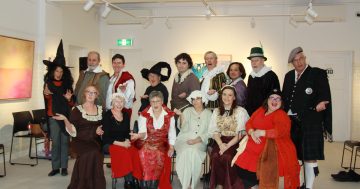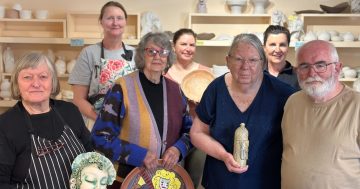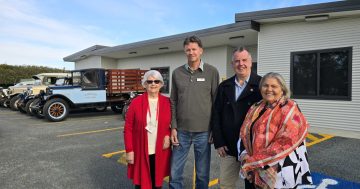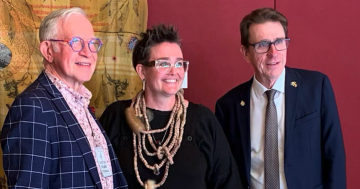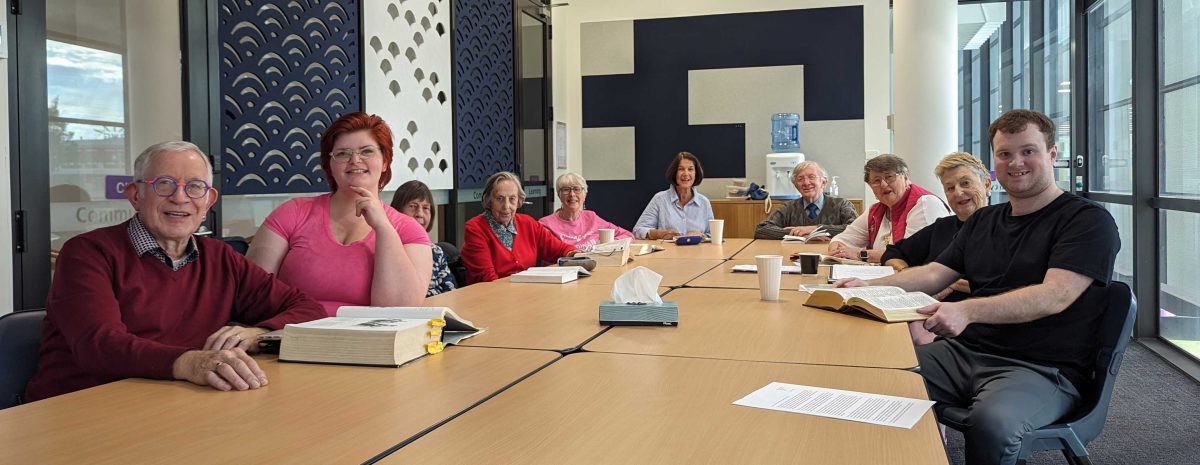
Some 120 years on from their group’s creation, Wagga Wagga Shakespeare Club members still meet monthly to read and appreciate the works of the man widely regarded as history’s greatest author. Photo: Jarryd Rowley.
When thinking about where the world’s oldest Shakespeare club is based, you’d be excused for thinking: ”Surely it’s based in England or Europe somewhere?”
What if you were told it’s in Australia?
And if you thought it must be in Sydney or Melbourne it would be a good guess, but you’d be wrong.
Turns out the world’s oldest Shakespeare club is right here in Wagga Wagga.
In 1904, 288 years after the death of Shakespeare and more than 16,800 km away from the famous Globe Theatre, a group of Wagga women formed a club to discuss The Bard’s works and have regular readings of the world’s most famous playwright and poet.
Little would those women have known that 120 years later, a group of Shakespeare enthusiasts and history aficionados would still be meeting on the first Wednesday of every month and continuing their legacy.
“He was not of age, but of all time,” Wagga Shakespeare Club president Neryl Quilty said in reference to English author Ben Jonson.
“Now, Mr Jonson said that during the 1600s. Shakespeare’s basic ideas have not changed in 400 years and we are still learning more about him today, which makes that quote ring true.”
Neryl, who is one of the club’s newest members, having ”only” been attending gatherings for nine years, said a club with such a rich history transcended that of the country town in which it originated.
“I think this club is something to be very proud of,” she said.
“In Australia, anything that is 120 years old and still going is something that should be recognised. It’s [the club] only a couple of years younger than the country itself.”
The title of the world’s oldest club isn’t a self-proclaimed one either. The official Shakespeare Birthplace Trust, founded in 1847, recognised the Wagga-based group as the oldest continuously meeting club in the world, a distinction that is important as most other clubs took a pause during both World Wars.
Another factor that separates Wagga’s club from others around the world is that 10 years ago, the all-women club began allowing men to join their ranks.
Despite not being allowed as a formal member of the club, English professor at Charles Sturt University David Gilbey regularly attended meetings as a guest as far back as the 1970s and was among the first men to sign up following the relaxing of memberships.
“I can’t remember who invited me back then, but I remember meeting Fey [Walters, the club’s oldest currently serving member] and other members of the club and being so impressed with how much Shakespeare wisdom there was and how much experience of Shakespeare everyone had, which was far greater than mine,” Mr Gilbey said.
“One of my personal top learning experiences from this group was when they would ask me to do something a bit different, but within the spirit of Shakespeare. I would bring a novel or poem and we would read it as if it was a Shakespearean play.
“We would read about a dozen stanzas and move on to talk about the richness of the language and hold discussions. It was terrific.”
One of the club’s newest and youngest members, 21-year-old Balin Willis, began his time at the club at the beginning of the year.
Balin said he enjoyed Shakespeare from his time at high school and wanted to continue learning and reading about him and his works. After discovering the club and visiting several times, he said it had become one of his monthly joys.
“The first time I came to a meeting, we were reading A Midsummer Night’s Dream,” he said.
“About five years ago, I was reading it as part of my 10th-grade play. Comparing reading it at high school to my time here was very interesting. I saw it very differently and I really enjoyed my time.
“I really think people, not just of my generation but everyone else, should give Shakespeare a go.”
The club officially celebrates its 120th anniversary on 10 July and with the date being just around the corner, Neryl, David, Fey, Balin and the other Shakespeare club members can’t wait to celebrate Elizabethan style with the rest of Wagga Wagga.
“We will be looking at holding an event,” Neryl said.
“We haven’t decided the exact date yet, but when we do we hope to see a few people come down and celebrate with us.”








